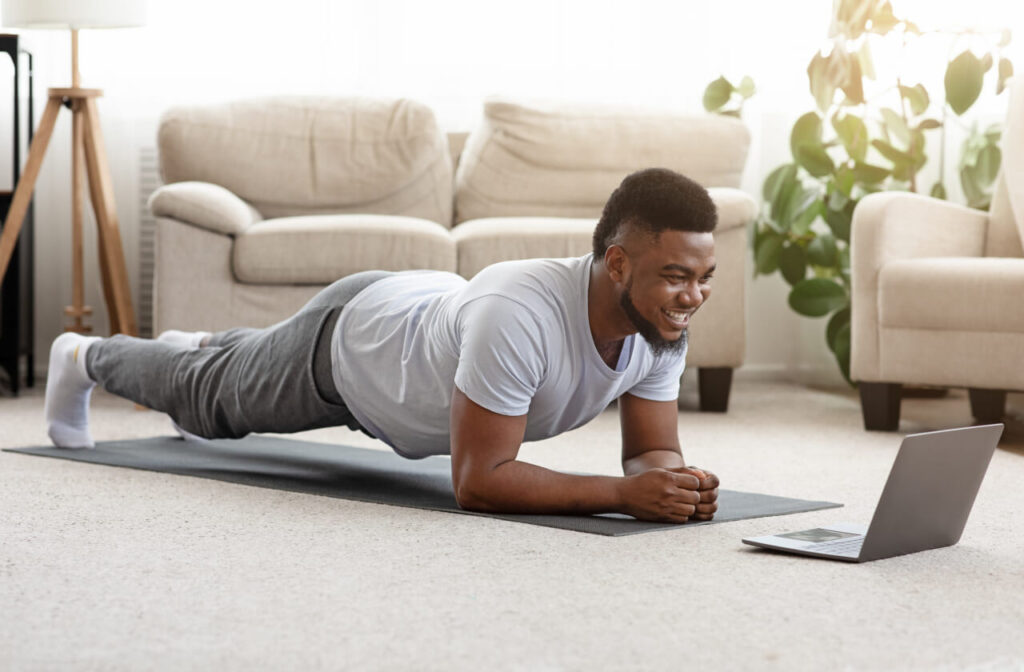Disclaimer: Affiliate links are used in this blog post. Please see our Affiliate Links policy in our Terms & Conditions page for additional details.
Many businesses have had to adapt to the issues of running a business during COVID-19, and the service industry — specifically the health and fitness sector — is no exception. With many cities issuing strict stay at home orders and the temporary closures of fitness facilities, people are looking for ways to keep fit at home to support their mental and physical health. Coaches and fitness instructors within the health and wellness industry have had to come up with innovative ways to help their clients exercise at home during this pandemic. Virtual coaching comes with its host of challenges, leaving many personal trainers and fitness facilities no choice but to rise to the challenge to support their clients differently and still bring in revenue.
When it comes to online training for coaches who are familiar with providing one-on-one coaching, this transition to online personal training packages takes some getting used to. There are hurdles in what equipment your client has available to them or whether they can work out due to work or family obligations. Considering many kids are at home due to school being out right now, most children may need some more attention. Working from home sometimes results in a ‘grey area’ boundary balance between work a life. Therefore, curating plans for your clients that fit their overall goals is the most important. However, before creating a premium custom workout plan, the first step should be establishing those goals and adjusting to the lifestyle changes. Many clients’ goals have changed while stuck at home, perhaps unable to work, leaving them to ask for guidance in different areas. Mindfulness activities or directing your clients to an online meditation group may be very important to incorporate to any routine. With some clients experiencing anxiousness and loneliness during this strange time, checking in with your client’s mental health is extremely important. Accountability check-ins may be more frequent, and necessary. Regardless, it’s important to assess each client’s unique situation and adjust as needed.

The biggest thing many clients have expressed that they need to conquer their health and fitness goals is a feeling of support. With human connection limited to your quarantine bubble or a digital screen, personal trainers need to get creative with how they can show support. Sometimes writing out programming and having a weight loss goal is not enough. Jason Martin, the owner of BioLink Performance, believes part of programming towards your client’s “new normal” must include understanding their new routine. “They are likely not moving around as much, they likely have less control over their routine, and they are likely having trouble sleeping… As trainers, we now get to do a deeper dive into people’s limiting factors — the things stopping them from achieving their goals — and make a plan accordingly.”
There will be different challenges posed for each client; however, overcoming obstacles is what trainers do! This mindset opens up the discussion or consideration of what a coach should have: What different coaching styles do their clients need, and how are they able to support them? For those clients who can read programming with minimal questions and go about their merry way, they may benefit more from online personal training software such as Caliber, following an customized Excel sheet program, or using an online fitness tracker. On the other hand, some people may not have any equipment at home. This opens the option of creating a bodyweight exercise program and perhaps incorporating some yoga and pilates to change things up. If you normally engage in group training, you can encourage step challenges (socially distanced, of course) using wearable fitness trackers to maintain connection, encourage low-impact movement and encourage fostering community, safely. A safe, simple walk to break up the monotony of staying home all day could prove valuable for both physical, and mental, health.
Running club communities are likely missing group running right now. Running coaches who find themselves as a sudden virtual run coach can host online group graining and encourage their runners to still participate in races. Virtual 5k’s have been very successful over the years. Participants can sign up for a virtual running race, run sometime during the designated race dates, and submit their finishing time. Running coaches can host these types of run challenges themselves and mail inexpensive prizes or swag bags to finishers.

Like a running coach, you may be a personal trainer who previously offered group fitness classes or a gym owner whose revenue generation relies on a community engagement model. There are options for group training classes, such as Instagram Live, Facebook Live, or Zoom and more online options popping up as the demand for online content has exponentially increased with consumer demand. Strength and Conditioning Coach Jacob Danque says people are starting to see the benefits of online group training, “Now that we’re using Zoom exercise options, it shows people that you don’t necessarily have to go to a gym for an effective workout.” Many trainers and facilities have progressed to offering the option of purchasing session bundles or monthly subscriptions.” Danque has gone as far as reaching out individually to all 35 of his participants weekly to check in. “They’ll get an automatic text from [me] on Monday [asking] them, “How can I make your experience better with this class,” or “How can I help you this week?”

Maybe you’re not one to put yourself out there on camera in a group fitness class. Create a fitness eBook or host seminars or online workshops; these are other excellent ways to disseminate information to others to support their fitness goals. You can combine a free and paid model to your content offerings to expand your audience with the goal that newly interested customers will purchase your online training services. While stuck at home during lockdown, now is a great time to work on your website and incorporate a blog. This is a great way to share content, boost your digital presence and look to expand your customer reach. If you have a sizable email distribution, a monthly newsletter with recipe ideas, mindfulness tips or suggestions for easy low impact exercise at home is a fantastic way to promote your expertise and grow your overall brand. In our blog, The Pros & Cons of Free vs. Paid Content, we go over suggestions for sharing free content with suggestions and strategies to monetize content in the digital era.
If you are a creative person wanting to utilize social media, challenge your followers to something. Post a photo and then have them “tag” their friends next! These days, digital marketing content is key to fostering community engagement and to do so, social media is the tool to keep connected with your clients. Facebook live challenge competitions have been popping up all quarantine, from doing 25 push-ups to 30-Day Plank Challenges. If you’re feeling overwhelmed, remember it doesn’t have to be complicated. With indefinite work from home arrangements, a movement challenge could be as simple as creating a standing desk setup for the day, with a few squats sprinkled in.
While I cannot wait to see my clients in person to train them, we have to accept for now that there is a new normal. Finding what your clients need first for support is the most important. Making sure to keep a human connection is key. Align their needs with what you can provide to help them achieve their goals during this difficult time. Until we can see each other again in person, however that new normal may look like, we can still find a sense of success by continuing their health and fitness goals during this trying time.